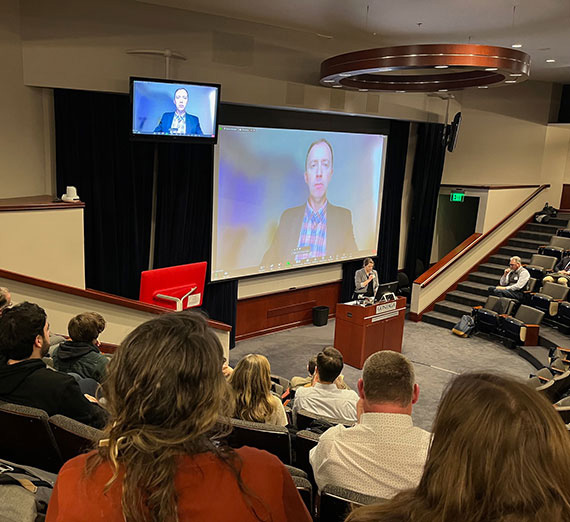Laying the Groundwork for Complex Conversations

The relationship between Israel and the Palestinian community in Gaza was volatile prior to the Hamas attacks on Israel Oct. 7, and that country’s ensuing and ongoing military response has turned a hotter-than-ever global spotlight on the Middle East conflict.
Debate and discussion on topics ranging from terrorism to genocide, religion to realpolitik, have reverberated through the halls of power around the world, and across college campuses in the United States, including Gonzaga. Incidents of antisemitism and anti-Muslim and anti-Arab bigotry are on the rise as students from across the political and religious spectrums grapple with the horrific images filling television airwaves and their social media feeds.
To help the GU community navigate this complex time, the Provost’s Office, the Office of Mission Integration, the Office of Inclusive Excellence, and faculty/staff partners from across campus recently launched the “Conversations on Israel and Gaza Series.”
“Before such a global crisis can be addressed, it must be processed in how it came to be,” said GU Provost Sacha Kopp. “Before it could be processed, it had to be spoken about. Even the language used to speak about these events caused further misunderstanding and harm. We saw this play out on numerous campuses.
“What we hope to bring to the Gonzaga community is a series of opportunities to learn about, better understand, and talk about these events in the Middle East. We must learn the history, the culture, the religious beliefs, the politics and more that all come together in this complex space.”
The first event was a presentation and exercise called “Bridging Divides Through Interfaith Leadership.” The program, co-hosted with GU’s religious studies department, was delivered by Todd Green from Interfaith America, an organization dedicated to building relationships across diverse religious communities.
The “Bridging Divides” event was geared toward GU faculty and student-programming professionals, and while it did not specifically address the Israel-Hamas conflict, it delivered a valuable look at the religious diversity and demographics in America and in higher education. It educated the group on terminology used in interfaith cooperation, and showcased the framework Interfaith America uses for building relationships across religious differences to address issues like antisemitism, Islamophobia and other forms of religious bigotry.
“With this global conflict we have seen an increase in incidents of discrimination against Jews, Muslims and persons of Arab descent here in the U.S.,” said religious studies department chair Shannon Dunn. “These forms of religious and ethnic hatred are dangerous and finding ways to address them and speak out against them is necessary.
"Compassion enables us to listen to points of view that challenge us at times and allows us to seek peace. Even if we alone are unable to solve a large global conflict, we can seek peace and truth in our community and uplift voices that resist simple narratives of the conflict.”
Interfaith America’s Green brought scores of data to illustrate attitudes that Americans and college students have about faith and religion, much of it eye-opening. While the uptick in antisemitism and Islamophobia might indicate that Jewish and Muslim communities are inevitably going to be in conflict, Green’s data showed that both groups were more open to religious diversity and more likely to have relationships with members of other faiths than members of several other popular religions. And relationships, Green noted, “are game changers when it comes to reducing negative attitudes towards a religious community.”
Interfaith America led a massive study of 122 college campuses and their students’ attitudes and experiences with religion, publishing the findings in 2020. The most heartening result of that study? Almost three quarters of college students said they are committed to bridging religious divides. Less heartening is that the study also showed that colleges are not doing a great job giving students the tools they need to do that work, Green said. Students will often go through diversity training to learn about people from different races, nationalities, gender identities and sexual orientations, Green added, but only nine percent said they’d participated in any training that paid attention to interfaith issues or religious diversity.
Kopp recalled an interfaith prayer service held on campus in the aftermath of Oct. 7, where “we saw a strong desire amongst the Gonzaga community to come together and grieve and process and pray for a better future in the Middle East.”
“In the Jesuit context, we are reminded that ours is relational work,” Kopp said. “So, as much as we are here to educate and learn, the purpose behind that learning is to build relational community here and in the communities where our students will ultimately journey.”
Gonzaga’s recent update to its Strategic Plan puts a focus on civil discourse, and plans are in the works for the creation of a Center for Ignatian Dialogue and Discernment that will help model public civil discourse on the most pressing, complex issues of our time. Certainly, issues rarely get more complex than those being addressed by the Israel-Gaza series.
Ellen Maccarone, GU’s acting vice president for mission integration, hopes the series will help the Gonzaga community understand just how fraught things are in the Middle East, and how the conflict there affects people in our own community as well as around the world. And she believes Gonzaga is a good place to lead just these kinds of conversations.
“Jesuit education has always grappled with tensions,” Maccarone said. “In preparing people for leadership, we have to engage in critical thinking, listening, asking questions, and understanding. These are all skills necessary for engaging in complex topics like this one, and these are at the heart of Jesuit education.”
Watch for announcements of new events in the series coming soon.
